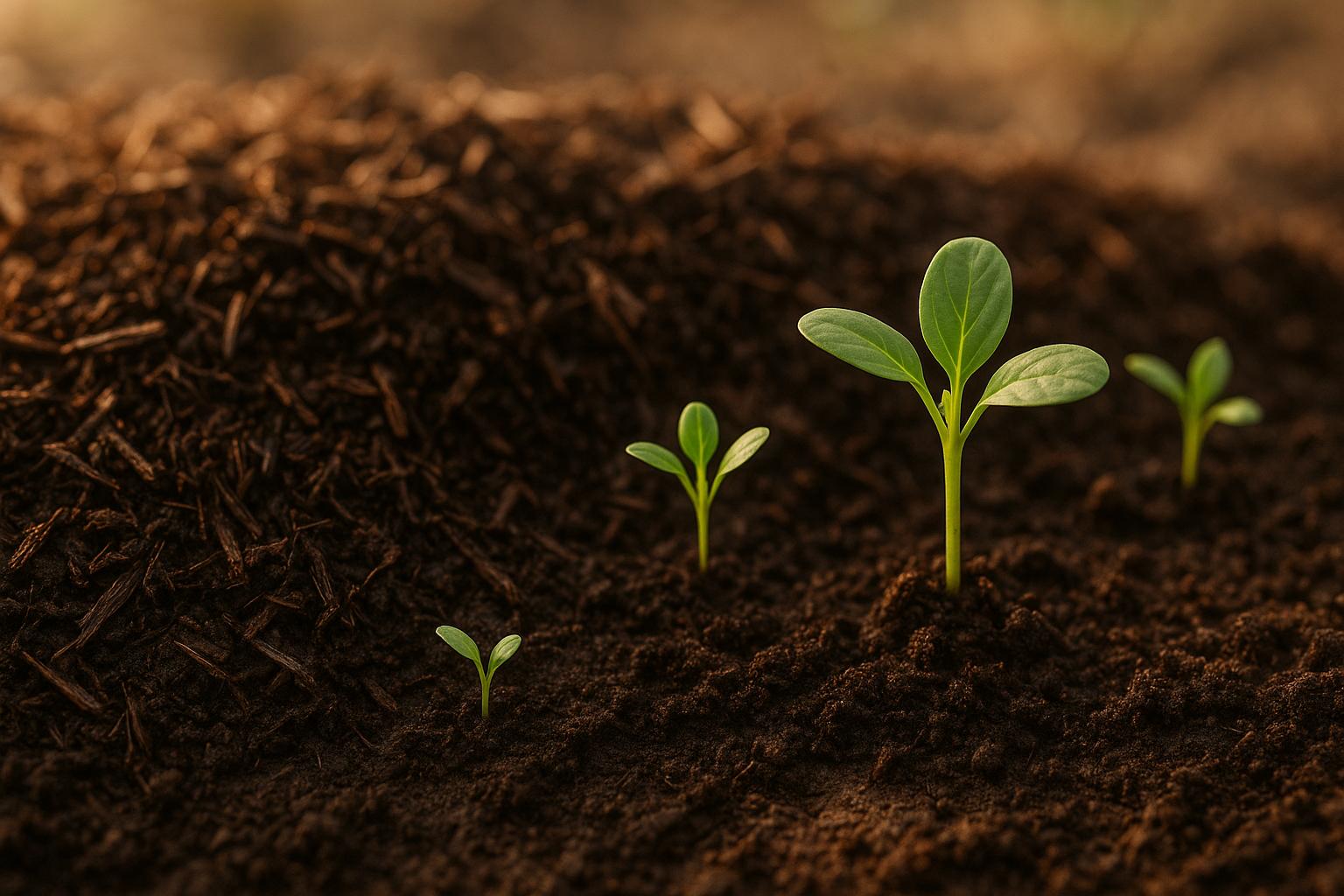- bhavya gada
- No Comments
Compost mulch is a powerful tool for improving soil health. It combines the benefits of traditional mulches with the added advantage of enriching your soil over time. Here’s why you should consider it:
- Nutrient Supply: Slowly releases nutrients like nitrogen, phosphorus, and potassium, reducing the need for synthetic fertilizers by up to 75%.
- Moisture Retention: Helps soil hold water better, cutting irrigation needs by 30–70%.
- Weed Control: Blocks sunlight to reduce weed growth by up to 90%.
- Erosion Prevention: Protects soil from compaction and runoff during heavy rains.
- Better Soil Structure: Encourages earthworms and microbes to improve soil quality naturally.
For Maryland gardeners, compost mulch is especially useful in managing the region’s challenging climate, from hot summers to heavy rains. Apply a 2–4 inch layer in early spring or late fall for the best results. This natural solution not only boosts plant health but also saves money on water and fertilizers while supporting long-term soil vitality.
Nutrient Enrichment and Soil Fertility
Slow-Release Nutrients for Healthier Plants
Compost mulch works as a steady source of essential nutrients that plants can absorb over time. It delivers key elements like nitrogen for lush foliage, phosphorus for strong roots, and potassium to boost plant resilience. Research highlights how organic mulching transforms nutrients into stable humus, which increases the soil’s ability to hold and exchange nutrients effectively [1][7]. Unlike synthetic fertilizers that provide a quick but short-lived nutrient surge, compost mulch ensures a consistent nutrient supply, promoting long-term plant health.
The nutrient content of compost depends on what goes into it. For example, green materials like grass clippings produce nitrogen-rich compost, which is great for leafy vegetables. Meanwhile, brown materials such as fallen leaves contribute more carbon, improving soil structure.
This gradual nutrient release not only nourishes plants but also minimizes the need for additional fertilizers.
Reducing the Need for Synthetic Fertilizers
By delivering nutrients in sync with plant needs, compost mulch significantly cuts down the reliance on synthetic fertilizers. In fact, some studies suggest that soil enriched with compost can reduce fertilizer requirements by as much as 75% [3].
Here’s a simple comparison of how nutrients are released from synthetic fertilizers versus compost mulch:
| Nutrient Source | Release Pattern | Environmental Impact |
|---|---|---|
| Synthetic Fertilizers | Rapid release | Higher runoff risk |
| Compost Mulch | Gradual release | Minimal runoff |
Compost mulch also supports soil microbial activity, which breaks down organic matter into plant-usable forms. This microbial action helps create soil aggregates, improving the environment for roots to thrive. These natural processes ensure continuous nutrient cycling and contribute to a healthier soil ecosystem.
For gardeners in Maryland, the slow nutrient release of compost mulch is particularly useful. The region’s humid subtropical climate, with its heavy summer rains, can lead to nutrient loss from synthetic fertilizers through leaching. Compost mulch, however, holds onto nutrients more effectively. It also helps regulate soil pH by nudging overly acidic or alkaline soils toward a neutral range, ensuring nutrients remain available in the ideal pH range of 6.0 to 7.0 [2].
Incorporating compost mulch into your garden not only enriches the soil naturally but also reduces the need for chemical fertilizers, creating a more sustainable and resilient growing environment.
Moisture Retention and Drought Resilience
How Compost Mulch Retains Moisture
Think of compost mulch as a shield for your soil. It blocks direct sunlight and wind – two major culprits behind water evaporation – helping to keep moisture locked in where your plants need it most [11]. Its porous structure acts like a sponge, soaking up water and releasing it gradually, which ensures steady hydration for your plants [1][3].
The numbers speak for themselves: compost-enriched soil can hold up to 16 times more water in sandy soils, cutting irrigation needs by as much as 30–70% [3]. In raised beds, using compost mulch has been shown to improve soil moisture retention by an impressive 65% compared to areas without mulch [3].
It doesn’t stop there. Compost mulch helps break up compacted clay, allowing water to penetrate deeper, and it enhances water retention in sandy soils [3][10]. By insulating the soil, it also moderates temperature fluctuations, reducing heat stress on plants. This encourages deeper root growth, which strengthens drought resilience even further [2][4][3]. These moisture-retaining perks are especially vital for Maryland’s unpredictable weather patterns.
Application Tips for Maryland Climate
Maryland’s climate can be tricky – hot, humid summers, dry spells, heavy fall rains, and unpredictable spring weather all make moisture management a challenge. To get ahead of the summer heat, apply compost mulch in early spring so your soil is primed to retain moisture when it matters most [2].
A 2–4 inch layer of compost mulch strikes the right balance. It keeps the soil hydrated without smothering plant roots or encouraging fungal growth [2][4]. Spread the mulch out to cover the drip line – the area beneath the outermost branches of each plant – but leave a few inches of space around stems and trunks to avoid rot [2].
To check if your soil needs more moisture, stick your finger about 2–3 inches into the ground. If it feels dry, refresh the mulch layer, especially after heavy rains or the harsh conditions of winter [2].
Weed Suppression and Soil Protection
Natural Weed Suppression
Compost mulch is an excellent natural solution for controlling weeds. By blocking sunlight from reaching weed seeds buried in the soil, it prevents them from sprouting. For the best results, apply a layer of compost mulch about 2–3 inches thick. This simple, chemical-free method is highly effective in reducing weed growth [2][8].
Studies show that organic mulches, like compost, can cut weed growth by as much as 90% when applied correctly [8]. Research from university extension programs found that garden beds covered with compost mulch had fewer than 5 weeds per square meter, compared to 50–60 weeds in untreated areas [2].
Unlike synthetic herbicides, which can harm soil organisms and pose risks to pets, wildlife, and children, compost mulch supports soil health. It encourages microbial activity, boosts fertility, and naturally reduces weed pressure. This creates an environment where your plants can thrive while weeds struggle to take hold [2].
Below the surface, compost mulch promotes a thriving ecosystem of earthworms, fungi, and beneficial bacteria that help suppress pathogens and inhibit weed growth [1][4]. Beyond weed suppression, it also strengthens the soil structure, making it more resilient to environmental challenges.
Erosion Control and Soil Structure Preservation
Compost mulch does more than just control weeds – it also protects your soil from erosion. Heavy rainfall can wreak havoc on unprotected soil, but compost mulch acts as a buffer. It absorbs the impact of raindrops, preventing soil compaction and crust formation [3]. By slowing water runoff, it also improves water infiltration [3].
Maryland’s weather, with its intense summer storms and heavy spring rains, makes erosion control particularly important. Compost mulch enhances soil aggregation, creating a stable structure that resists erosion even in tough conditions [3]. Its organic material helps bind soil particles together, further reducing erosion risks [3][7].
Over time, as the mulch breaks down, it continues to improve soil structure by adding organic matter. This not only increases water retention but also decreases runoff [3][7]. Research by Čížková and colleagues highlights how mulching improves soil aggregation, making it more resistant to erosion and compaction [7].
For Maryland homeowners, applying a 2–4 inch layer of compost mulch in early spring or late fall is ideal. Be sure to avoid direct contact with plant stems. On slopes, consider contour mulching or using coarser compost to keep both the mulch and soil in place.
The US EPA emphasizes the benefits of compost mulch, noting its role in preventing soil erosion and conserving water. It’s a practical and cost-effective solution for maintaining soil health in both residential and commercial landscapes. By using compost mulch, you can reduce the need for expensive erosion control measures while building a more resilient soil ecosystem that can handle Maryland’s unpredictable climate [6].
sbb-itb-843f8be
Application and Long-Term Benefits
Step-by-Step Application Guide
Applying compost mulch the right way is key to promoting healthy soil and thriving plants. The ideal time to apply mulch in Maryland is either early spring or fall [8]. These seasons allow the mulch to work effectively before the extremes of summer or winter weather take hold.
Start by clearing your garden beds of weeds and debris. If the soil seems dry, water it lightly to activate the beneficial microbes present in the compost mulch. Spread the mulch evenly, maintaining the recommended depth to ensure it suppresses weeds and retains moisture without suffocating your plants [8][2]. Be sure to leave a few inches of space around plant stems and tree trunks to prevent rot, and extend the mulch out to the drip line of each plant to protect the entire root zone.
After spreading the mulch, water it gently to help it settle and kickstart the decomposition process, which will enrich the soil. In Maryland’s climate, plan to refresh your mulch annually, especially after heavy rains or dry periods. For areas prone to erosion, like slopes, opt for a coarser mulch that’s less likely to wash away. Throughout the growing season, check the mulch thickness and add more as needed to maintain its effectiveness.
By following these steps, you’ll set the foundation for both immediate and long-term benefits for your garden.
Cost Savings and Long-Term Soil Health
The financial perks of using compost mulch start to show during the first growing season. By naturally providing slow-release nutrients, compost mulch can cut fertilizer costs by as much as 75% [3]. You’ll also save on water bills, as it reduces irrigation needs by 30–70%, a significant advantage during Maryland’s hot summers [3].
Over time, consistent use of compost mulch leads to healthier soil and plants. It boosts moisture retention by up to 65% and lowers the risk of plant diseases by 60% [3][5][10]. These benefits encourage stronger root systems, improve drought resistance, and reduce overall plant stress.
For sandy soils, compost mulch can increase water-holding capacity by up to 16 times, making your garden more resilient to Maryland’s unpredictable weather patterns [3]. In clay soils, it helps reduce compaction and improves drainage, while in sandy soils, it enhances nutrient and moisture retention.
Research from Ohio State University highlights that composted yard waste mulch significantly improves soil nitrogen levels and mineralization rates, leading to healthier plants and better yields [3][12]. This makes compost mulch a long-term investment that continually enhances soil quality, creating a self-sustaining cycle of improvement.
Professional landscapers, such as Pro Landscapes MD, have observed these benefits firsthand in gardens across central Maryland. Their expertise in applying and maintaining compost mulch helps homeowners maximize their savings while cultivating healthier, more sustainable landscapes.
On a broader scale, compost mulch offers environmental advantages. It reduces chemical runoff into waterways, supports beneficial soil organisms, and minimizes landfill waste [1][5][9]. By choosing compost mulch, you’re not only improving your garden but also contributing to a healthier ecosystem for your community.
Mulch Matters! The Easy Way to Healthier Plants & Fewer Weeds
Conclusion: Transform Your Soil with Compost Mulch
Compost mulch is a straightforward yet powerful way to create healthier, low-maintenance landscapes. By incorporating it into your garden, you can cut irrigation needs by 30–70% and reduce synthetic fertilizer use by up to 75% – offering real savings for homeowners[3].
But the benefits go beyond just saving money. Compost mulch works on a biological level to enrich your soil. Studies reveal that using composted yard waste mulch can significantly boost soil nitrogen levels[12]. This ensures your plants get a consistent nutrient supply while fostering a thriving community of beneficial microorganisms beneath the surface – a living ecosystem that supports long-term soil vitality.
At the same time, compost mulch addresses multiple challenges in your garden. It naturally suppresses weeds, prevents soil erosion, and even reduces plant diseases by as much as 60%[3][5]. This makes it an all-in-one solution for managing and improving soil health.
Pro Landscapes MD: "We prioritize eco-friendly solutions that conserve water, use native plants, and promote a healthy ecosystem in your outdoor space."[13]
The environmental impact is just as compelling. Choosing compost mulch helps recycle organic waste and minimizes chemical runoff into local waterways. These combined benefits make it an excellent choice for anyone aiming to create a sustainable, thriving garden.
Pro Landscapes MD has supported countless homeowners in achieving lush, low-maintenance outdoor spaces by applying compost mulch and other sustainable practices. Their expertise ensures you make the most of this effective soil amendment.
As highlighted throughout this guide, healthier soil starts with compost mulch. Whether you’re dealing with compacted clay, sandy soil, or stubborn weeds, this natural solution not only addresses immediate concerns but also improves your garden over time.
FAQs
What are the soil health benefits of using compost mulch?
Compost mulch is a game-changer when it comes to boosting soil health. Packed with key nutrients, it gives plants the nourishment they need to grow stronger and healthier. Plus, it helps the soil hold on to moisture, which means less time spent watering and more consistent hydration for your plants.
Another bonus? Compost mulch naturally suppresses weeds, cutting down on their growth and minimizing competition for resources. As it breaks down over time, it improves the soil’s structure, creating a richer, more fertile foundation for lush, thriving gardens and landscapes.
How should I apply compost mulch to my garden, and how often should I replace it?
To use compost mulch effectively, spread an even layer about 2 to 3 inches thick across the soil. Be sure to leave a small gap around plant stems to avoid issues like rot. Prioritize areas near plants and garden beds to get the best results. Compost mulch improves soil quality, keeps moisture in, and helps keep weeds under control.
Plan to refresh the mulch once or twice a year, ideally in early spring and late fall, or whenever it starts breaking down noticeably. Keeping up with this routine will support healthy soil and a flourishing garden.
Can compost mulch improve soil quality in clay or sandy soils, and are any adjustments needed for best results?
Compost mulch can do wonders for improving soil quality, whether you’re dealing with heavy clay or loose sandy soils. In clay soils, it helps loosen compacted particles, boosting drainage and making it easier for roots to grow. On the other hand, in sandy soils, it enhances water retention and keeps nutrients from washing away too quickly.
For the best results, spread a 2–3 inch layer of compost mulch evenly over the soil surface. If you’re working with clay soils, lightly mix some of the compost into the top layer to promote better aeration. With sandy soils, focus on keeping a consistent layer of mulch to lock in moisture effectively.


















Chat with Us